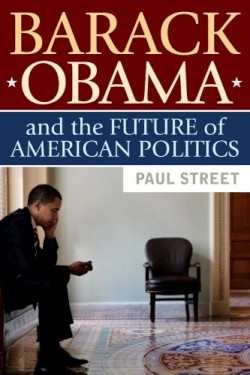Barack Obama and the Future of American Politics
For two years now, Republicans have been labeling Barack Obama a liberal, and often a “far left” liberal. Paul Street’s critique of the Democratic presidential frontrunner comes not from the right but from the progressive left. Once vice president of research and planning at the Chicago Urban League, Street worked for John Edwards’ presidential campaign. His articles have appeared in the Chicago Tribune, Z Magazine, the Journal of Social History, and other periodicals. His book is required reading for progressives, but citizens from all corners, whether or not they agree, will find that Street’s thesis is carefully researched and documented, and well argued.
Under particular scrutiny here are Obama’s writings and speeches and much of the commentary and reporting about him from his 2004 Keynote Address at the Democratic National Convention up to June 8 of 2008, just after he sealed the nomination. Street maintains that the senator is by no means a progressive and, contrary to popular opinion, not a liberal. Street looks closely at several vital issues that confront the electorate today—foreign policy and the Iraq war, health care reform, the economy, and race relations—and rates Obama as an “ideologically neutral” candidate in the typical “Coke vs. Pepsi” style of US elections. Like all Democratic presidents since FDR, Street submits that “an Obama White House could be expected to tilt toward elite economic interests” at the expense of the interests of the working class and the working poor. Street adds that Obama would perpetuate the “arrogance and criminality” that has typified the “militarism and imperialism” of US foreign policy over the past hundred years. Thus, for Street, the call for “change” and other populist rhetoric coming from the Obama camp rings hollow.
One of Street’s most compelling and forcefully argued points is that presidential candidates—Obama included—are preselected in what Lawrence H. Shoup has called a “hidden primary” conducted by corporate and military power bases. Street discredits Obama’s claim that his campaign has been financed by “an army of small donors.” On the contrary, Obama’s publicized financial ties to international corporations, the banking and securities industries, and defense contractors are documented here. But Street’s book is not a political rant, and Barack Obama is not the target. The ultimate enemy is the “corporate-dominated and militaristic U.S. election system and political culture.” He acknowledges that Obama, or any president unshackled from the Democratic Party, might be able to enact real change under heavy pressure from a grass-roots movement by a progressive citizenry.
Reviewed by
Joe Taylor
Disclosure: This article is not an endorsement, but a review. The publisher of this book provided free copies of the book to have their book reviewed by a professional reviewer. No fee was paid by the publisher for this review. Foreword Reviews only recommends books that we love. Foreword Magazine, Inc. is disclosing this in accordance with the Federal Trade Commission’s 16 CFR, Part 255.

